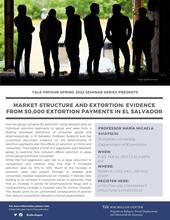How do gangs compete for extortion? Using detailed data on individual extortion payments to gangs and sales from a leading wholesale distributor of consumer goods and pharmaceuticals in El Salvador, Professor Sviatschi and her co-authors document evidence on the determinants of extortion payments and the effects of extortion on firms and consumers. They exploit a 2016 non-aggression pact between gangs to examine how collusion affects extortion in areas where gangs previously competed. While the non-aggression pact led to a large reduction in competition and violence, they find that it increased extortion rates by 15% to 20%. Much of the increase in extortion rates was passed-through to retailers and consumers: retailers experienced an increase in delivery fees leading to an increase in consumer prices. In particular, they find an increase in prices for pharmaceutical drugs and a corresponding increase in hospital visits for chronic illnesses. The results point to an unintended consequence of policies that reduce competition between criminal organizations.
María Micaela Sviatschi is an Assistant Professor of Economics at Princeton University. She is an affiliate at CESifo Research Network, NBER development and political economy group, the African School of Economics and the International Crisis Group.
Professor Sviatschi’s research interests are labor and development economics, with a focus on human capital, gender-violence and crime. One strand of her research explores how children start a criminal career in drug trafficking and gangs as well as the consequences of organized crime on economic development and state capacity. In particular, she has worked on the development of criminal skills in drug trafficking organizations in Peru and gangs in El Salvador. In addition, she studies how criminal organizations such as gangs and drug trafficking groups affect household’s behavior and state presence in the areas they control. She is also working with governments to design and evaluate public policies in narcotraffic and gang-controlled areas analyzing large administrative datasets.
Another strand of her research studies the role of state capacity to deter and improve service-delivery to reduce gender-based violence. In particular, she is studying the effects of women police officers in Peru and police street patrolling in India. In addition to this research, Professor Sviatschi has ongoing collaborative research projects in the Dominican Republic, Guatemala, Colombia, Mozambique, Jordan, Bangladesh and the US.
PRFDHR Seminar: Market Structure and Extortion: Evidence from 50,000 Extortion Payments in El Salvador, Professor María Micaela Sviatschi
Event time:
Tuesday, February 22, 2022 - 2:30pm to 3:45pm
Location:
Henry R. Luce Hall LUCE, 203
34 Hillhouse Avenue
New Haven, CT
06511
Seminar will be hosted online via Zoom and on-campus
Event description:
Admission:
Free but register in advance

